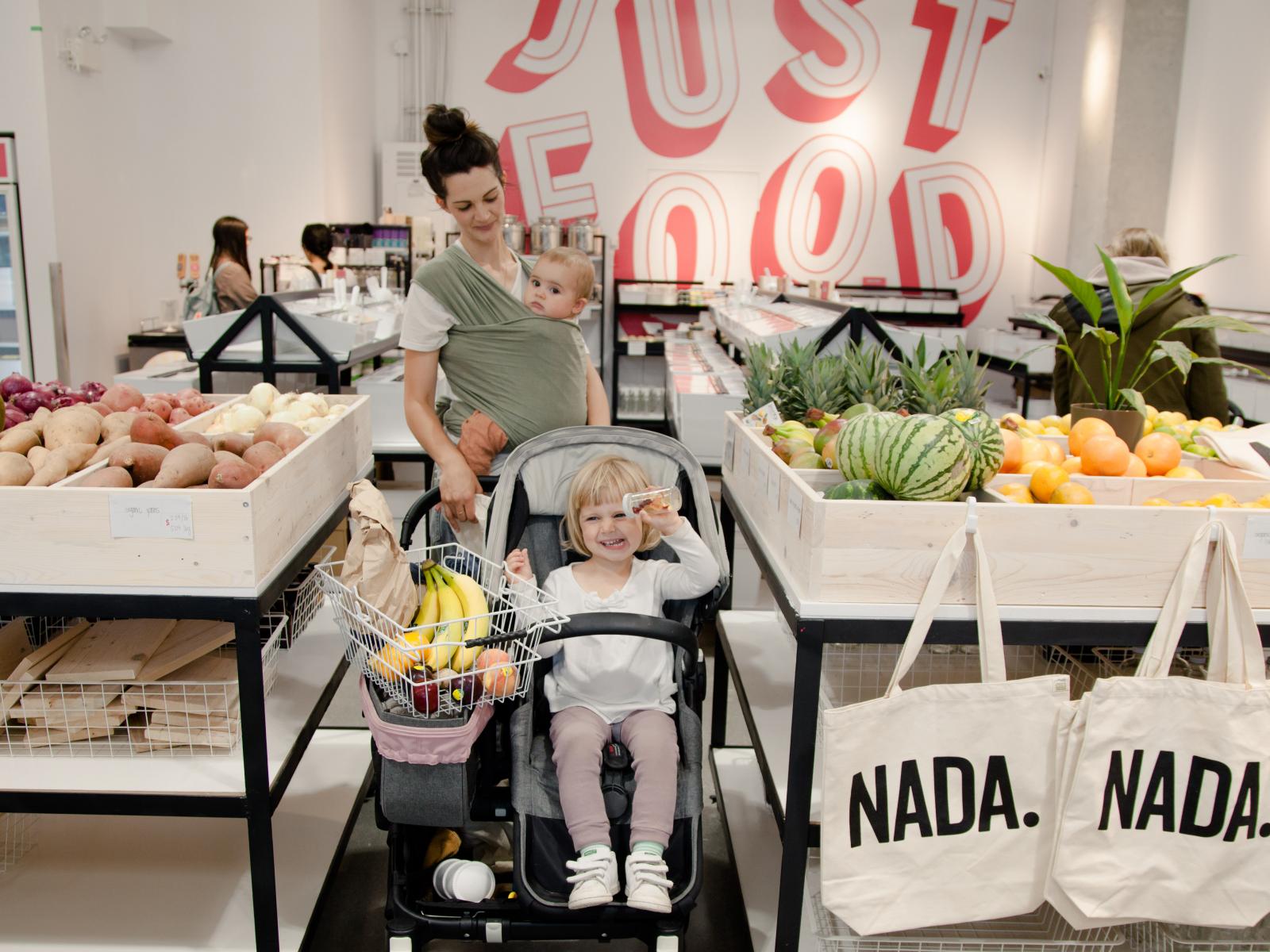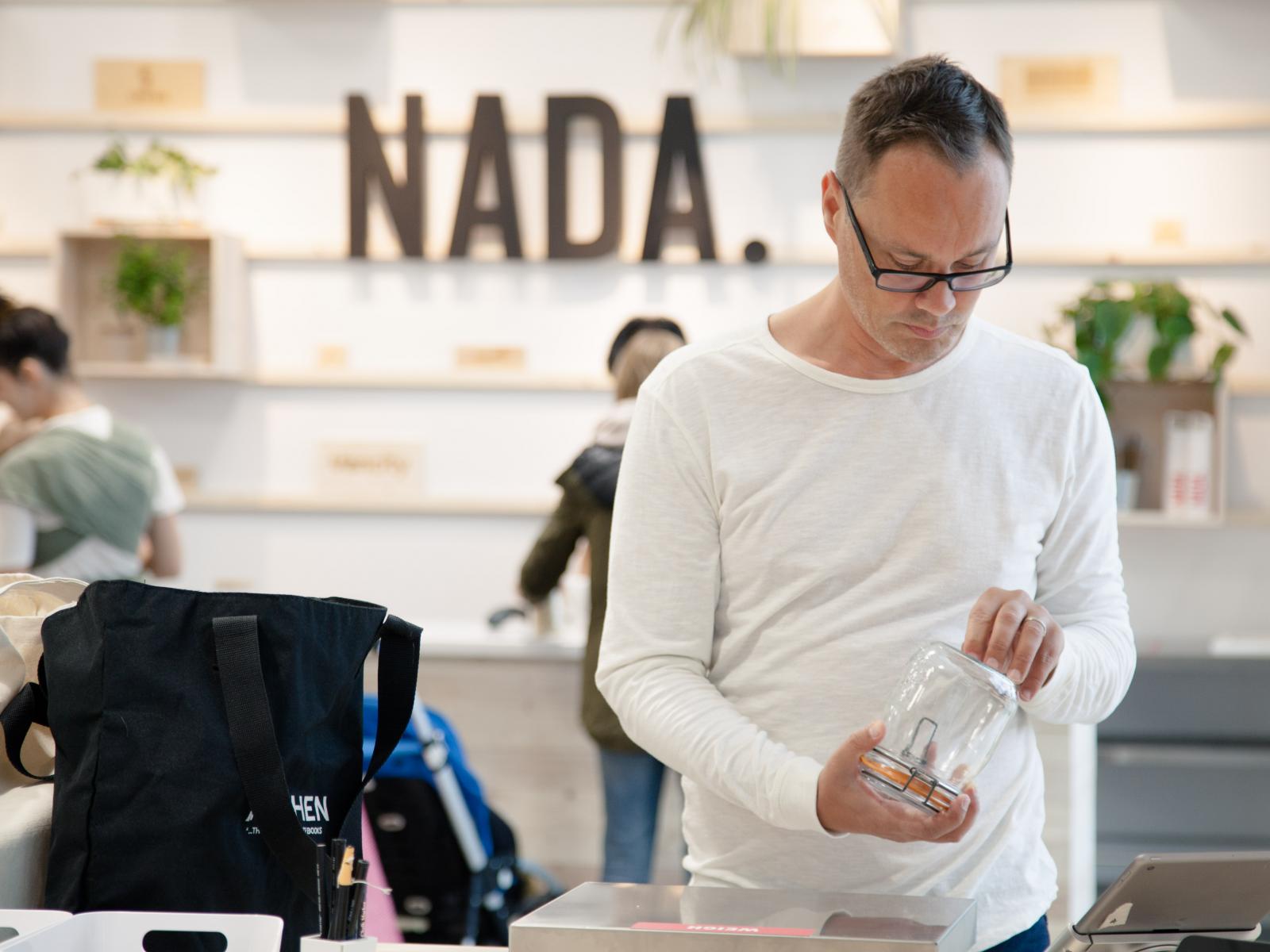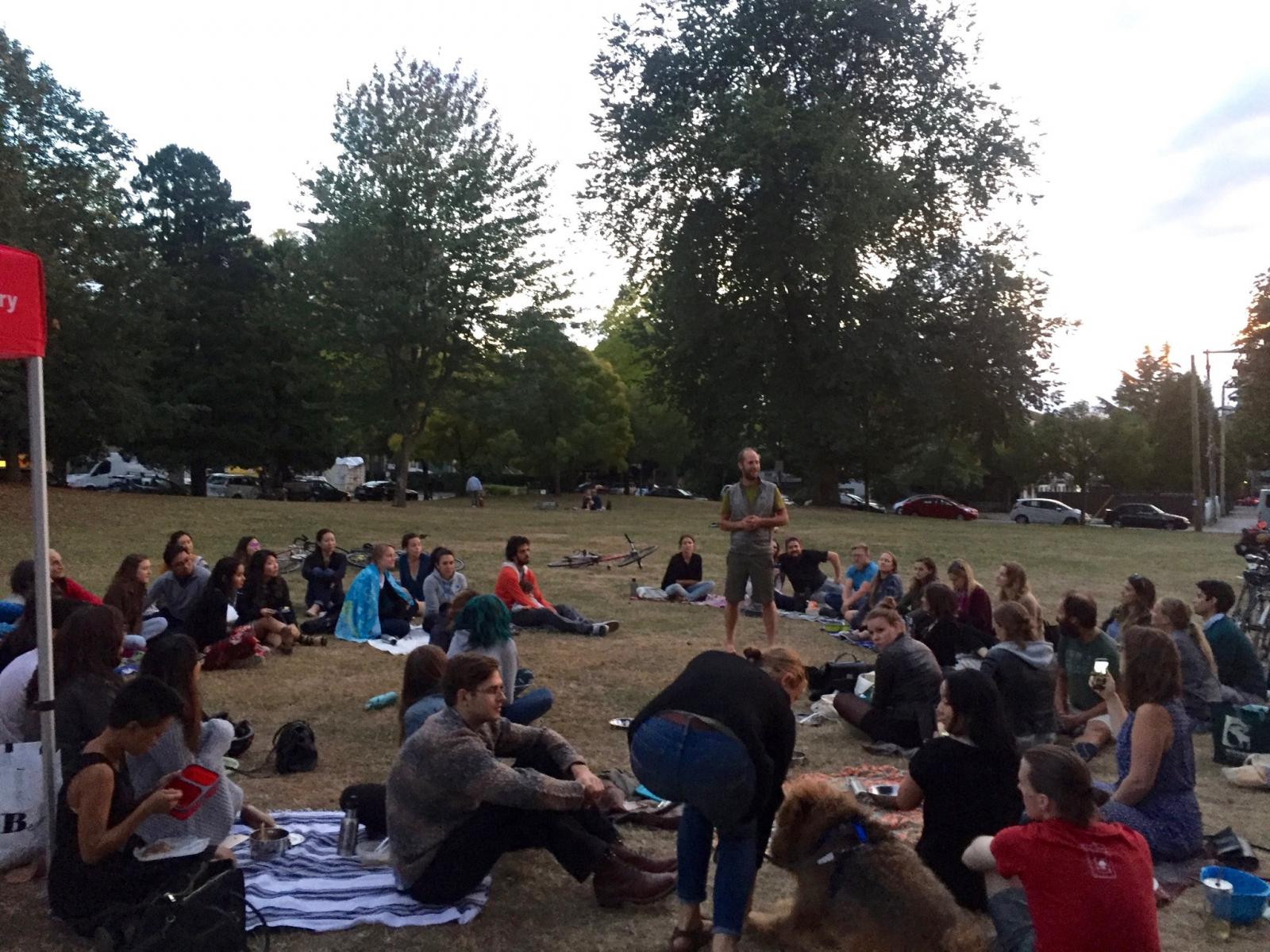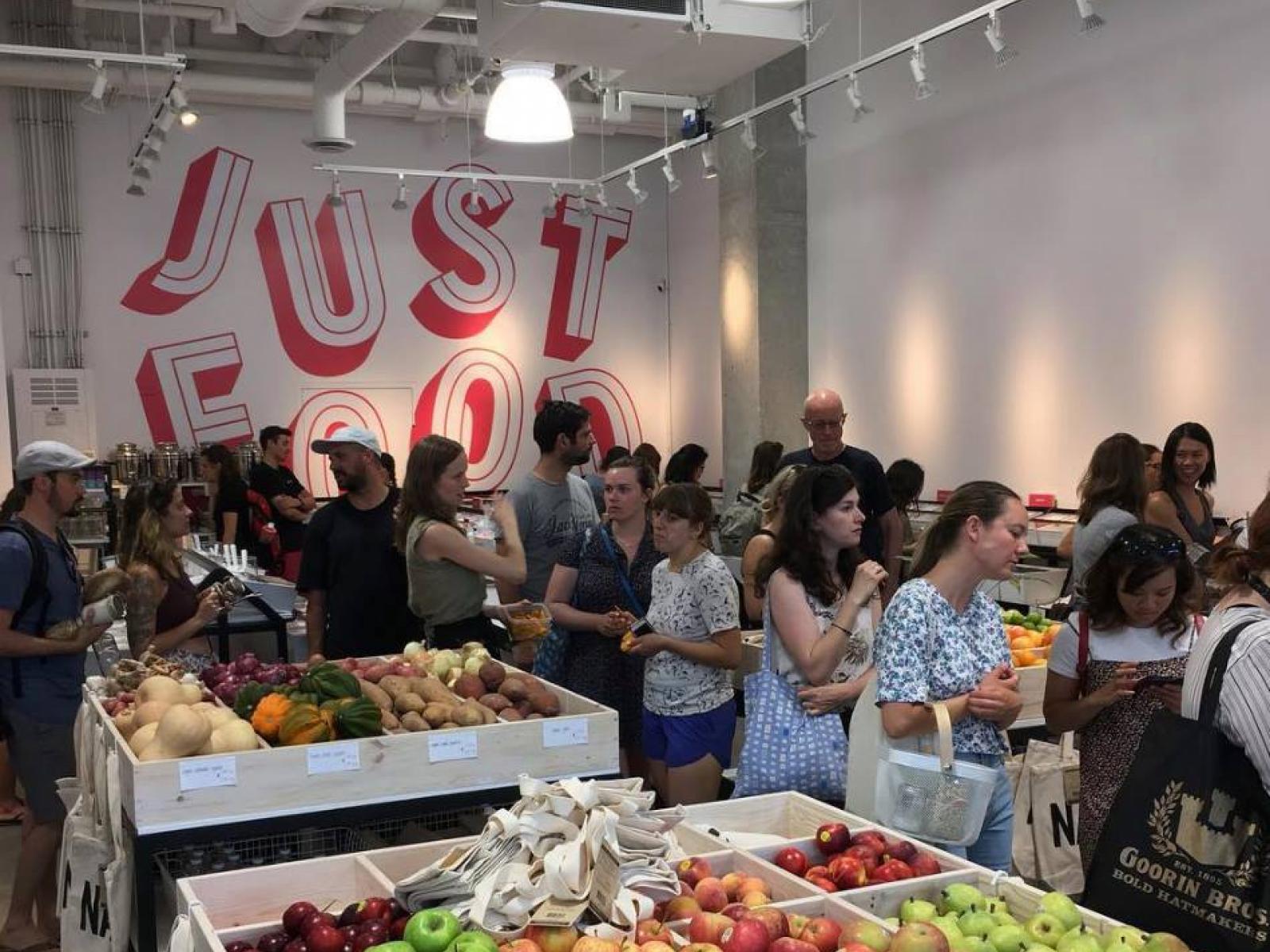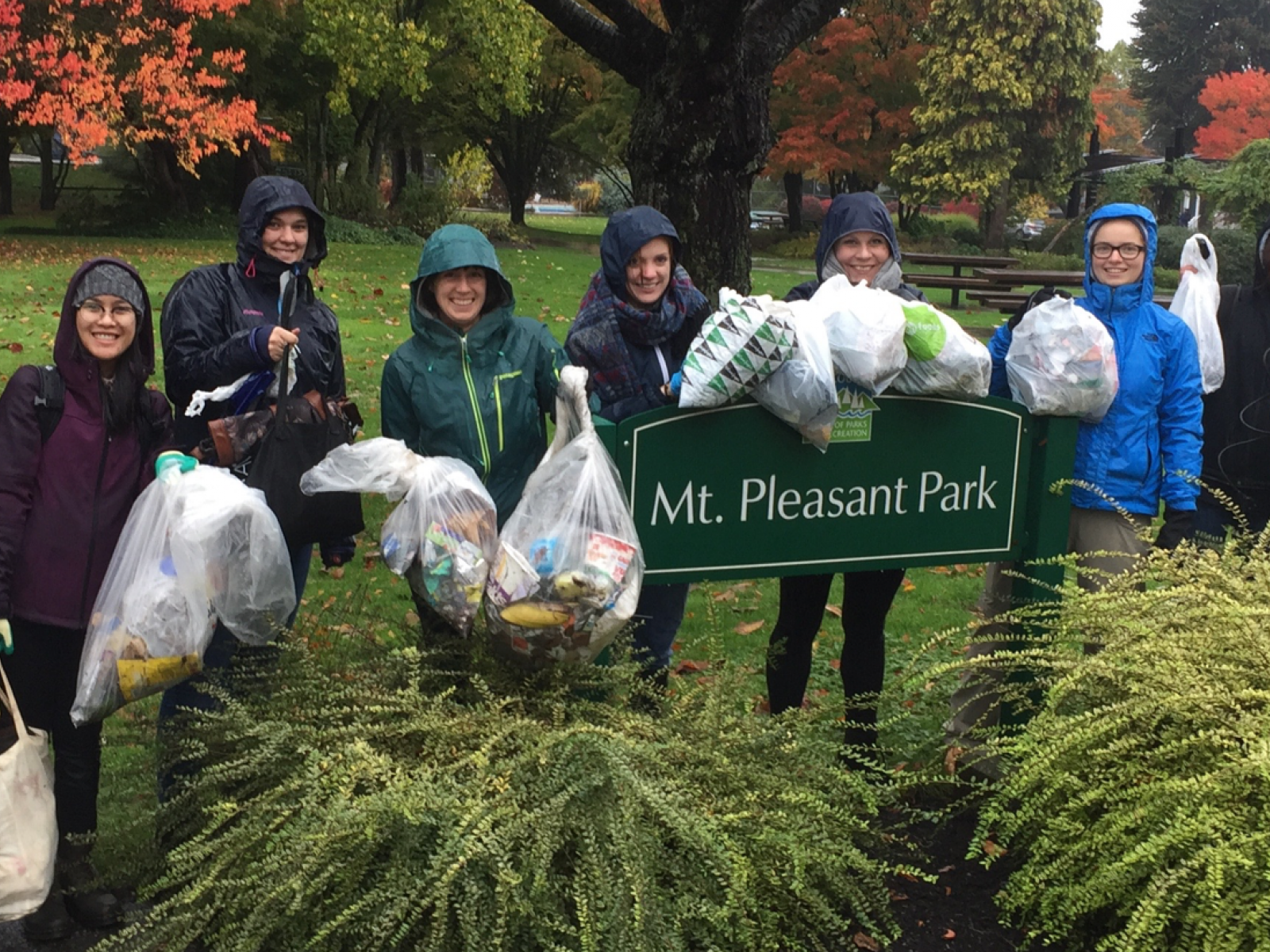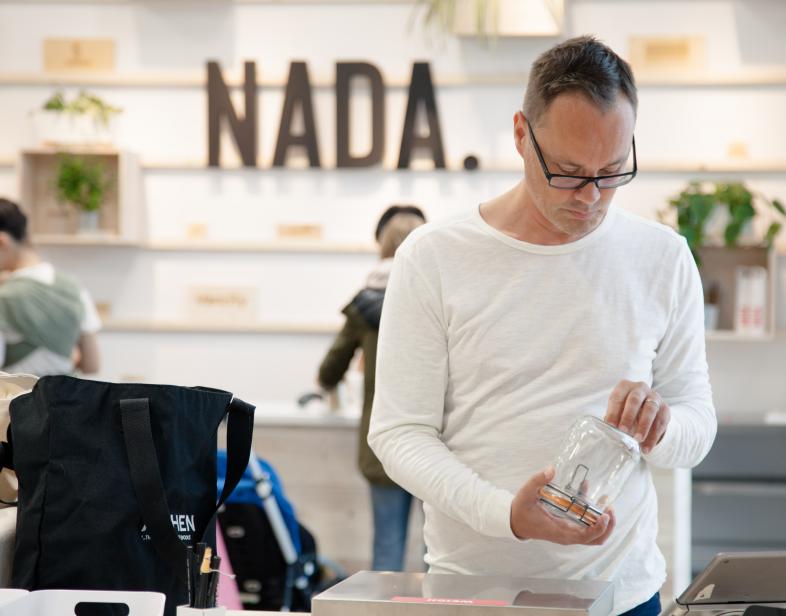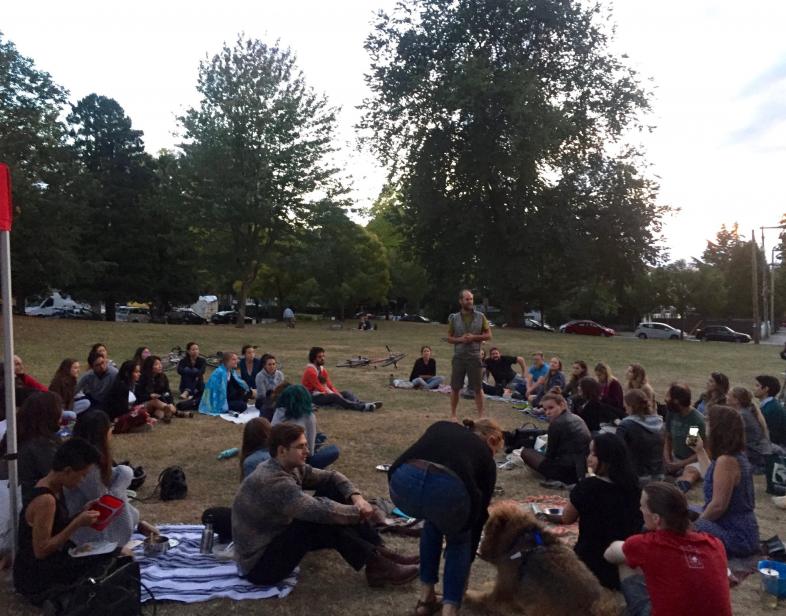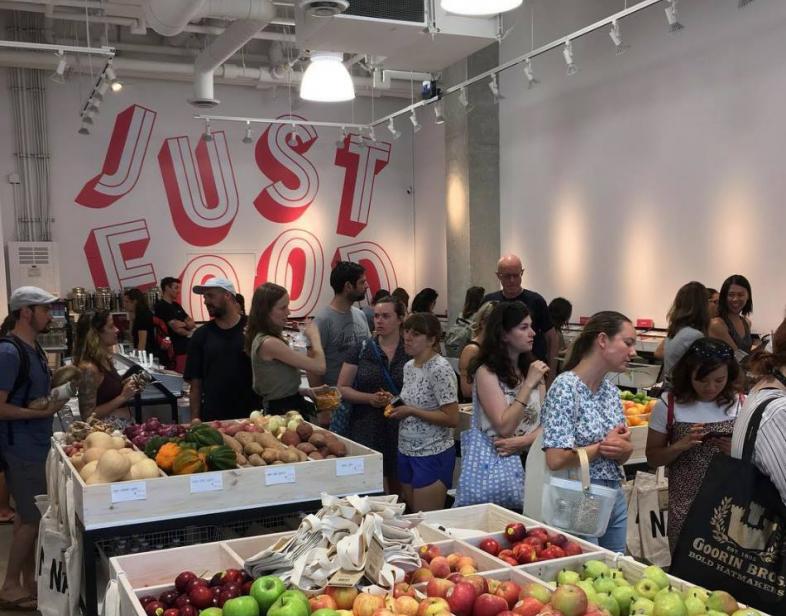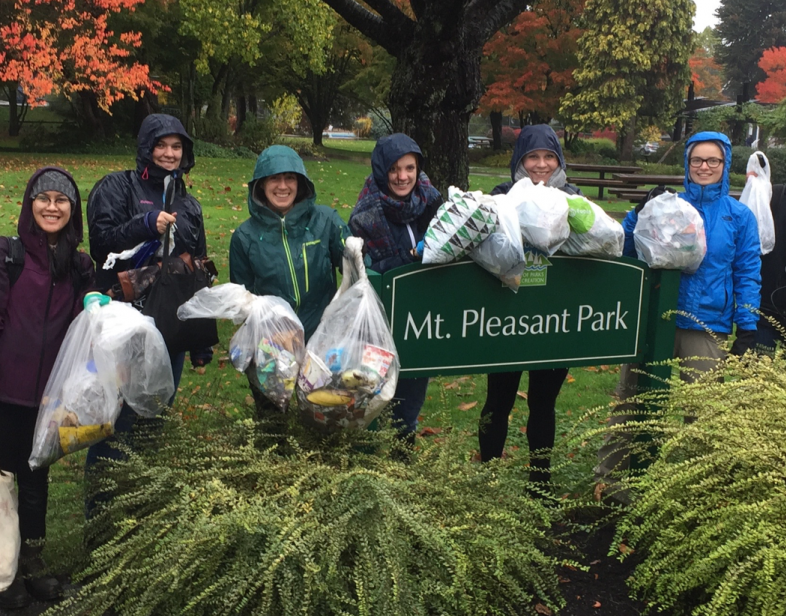An Overview Of Our Solution
Every year, North Americans send 50 million tons of food and food packaging waste to landfill, accounting for 45% of all landfilled materials. That’s the same weight as 225,000 Statues of Liberty! Both food waste and food packaging contribute directly to climate change through the production of greenhouse gases at various stages of the supply chain. Nada is a 100% package-free grocery store on a mission to cultivate a better world by inspiring people to change the way they shop for groceries. Nada is a certified B-Corp and 1% For the Planet member where customers can shop package-free with their own containers, enabling them to buy only what they need and preventing both food and packaging waste. Nada is currently diverting 20,000+ containers from landfill per month from a 2,300 ft2 retail space and is working with other stores to enable them to do the same.
- Population Impacted: 650,000 people + broader online community
- Continent: North America
Context Analysis
Our current food system, linked with consumer grocery shopping behaviour, is a large driver of climate change due to how we grow, transport, process, sell, consume, and dispose of food. Since the 1950s, 6300 Mt of plastic waste has been generated, of which only 9% has been recycled and 79% has accumulated in the environment. In addition to the greenhouse gases attributed to the raw materials and manufacturing of single-use plastics, recent studies have also shown that greenhouse gases are emitted as plastics degrade in the environment when they are exposed to sunlight. Grocery stores are contributing to the food waste & plastic pollution problems through unnecessary packaging, discarding food that is too ugly to sell, and pre-portioning food that is too much to eat. Tackling these issues at the source will have significant impacts on greenhouse gas reduction, but will require large shifts in both consumer shopping behaviour and food supply chain management.
Describe the technical solution you wanted the target audience to adopt
If current production and waste management trends continue, approximately 12 billion tons of plastic waste will be in the natural environment, including all oceans, by 2050; our shopping process helps to curb this production & consumption of unnecessary single-use plastic packaging. Nada’s focus is on source reduction - i.e. preventing both food and packaging waste before it is created. We want our audience to bring their own containers to shop for food - anything from a mason jar, cloth bag, tupperware, or reused food container is a win in our books! Our in-store weighing process encourages our customers to reduce food waste by buying only what they need (e.g. one cup of flour for a new recipe or a single sprig of cilantro) and to reduce single-use packaging by shopping with reusable containers that they already have on hand. We work with our staff to meet each customer at any point of their waste-reduction journey to ensure that our store stays inclusive and judgement-free!
Type of intervention
Describe your behavioral intervention
Large-scale changes in consumer grocery shopping behaviour must be encouraged to reduce food waste and plastic pollution at the source. A recent Vancouver Sun poll found that 79% of respondents were in favour of banning single-use plastics and a Single Use Reduction Strategy policy was subsequently implemented by Vancouver’s city council to support Vancouver’s 2040 zero waste goals. Nada is encouraging this community to re-think their shopping habits, and to make more sustainable choices when it comes to both single-use packaging and food waste. We do this not only through our retail store where we enable customers to shop package-free and buy only what they need, but also through community workshops, beach and trail clean-ups, film screenings, and panel discussions.
Our store makes package-free shopping an accessible, easy, and enjoyable experience. It has the capability to help connect people to their food and also to turn the way we shop into a completely different yet immersive experience. Nada has become a hub for all things zero waste, where we encourage simple yet effective tips and tricks for reducing waste. E.g. using beeswax wraps to prolong the life of food, swapping plastic straws and containers for stainless steel ones, encouraging the use of reusable containers for take-out. We have seen adoption of these behaviours not only with our customers, but also in our entire supply chain and with tens of thousands of people across the country.
As needed, please explain the type of intervention in more detail
At Nada, we envision an unpackaged future: a lighter world that values a food system free of excess and waste to support the health of both people and planet. Our behavioural intervention of enabling package-free grocery shopping appeals highly to our emotions. It’s hard to turn a blind eye to plastic pollution after you’ve seen the video of the turtle with the straw in its nose! Zero waste lifestyles are also highly socially incentivized; waste-reduction actions often invoke curiosity and spark conversations that lead people to think about their consumption. Focusing on small and simple individual waste-reduction steps typically gives others hope about improving the planet for future generations and inspires them to take action too!
Describe your implementation
The Nada business model is radically different from the mass-produced and globally shipped food network upon which conventional grocery stores rely. We have a holistic approach to the food supply chain – encompassing everything from our suppliers, customers, and community partners to our sourcing criteria, waste diversion, and energy use. At Nada, we’re passionate about education and empowerment when it comes to waste reduction. Many folks in Vancouver are well into their waste reduction journey, while others that walk through our doors completely new to the zero waste movement. Most understand the bring-your-own-container concept, while others require more explanation; it’s our job to meet each customer where they’re at, share our mission and vision, and explain our store processes so they can walk out feeling excited and empowered. We know that this is the best way to reach the masses and inspire change - by offering a friendly, non-judgemental attitude in a welcoming space.
Our test as employers is to empower our staff read the customer as they walk in the door. Some customers are beyond excited to be shopping at our store, are incredibly passionate about the zero waste movement, and enjoy shouting their waste-reduction efforts from the rooftops. Others walk in with a look of worry or confusion, while barely raising their eyes to meet our own. We’ve had several reviews left online about how customers were anxious coming in because they weren’t as educated about package-free living as our staff were, but that they left feeling included, excited, and empowered. We have a myriad of individuals walk through our doors, and we do our very best to treat everyone as an equal and to not claim perfection. We’re transparent about the waste we create, the over-ordering accidents, and the inevitable skid wrap that arrives with every pallet. Many of us are making moves to live more sustainably, and we’re here to strengthen this community and help each other out.
External connections
An ongoing goal is to always surround ourselves with people that are smarter than us! Last year, we formed an advisory board by identifying and filling gaps in our team with knowledgeable industry experts, including those from Whole Foods, SPUD, and BC Tech. We have also completed two impact business accelerator programs, providing access to a diverse range of mentors and resources, and the opportunity to collaborate and grow alongside values-aligned companies working towards a more sustainable future. Our work has also fostered collaborations with both the city and health authority, driving policy change and paving the way for other sustainable businesses.
Community building has been at our core since the get-go, and we’ve been fortunate enough to partner & continue to work with several large corporations including Fjällräven, Lululemon, MEC, Nature’s Path, Patagonia, Ten Tree, and Vancity. Two years of community building has helped to create an incredible amount of organic reach and online presence, we’ve tapped into this global community of grocery innovators, connecting with each other online and in-person to accelerate our missions and create valuable synergies. With our focus on supply chain innovation and working directly with hundreds of growers, purveyors, and community partners, our work has been featured in notable publications (online, in print, radio and television) including in The New York Times, The Huffington Post, Globe & Mail, CBC, and Global TV.
Who adopted the desired behaviors and to what degree?
Our customers are collectively diverting food packaging from landfill at a rate of 250K pieces/yr, subsequently rendering large savings in raw materials, transportation, greenhouse gases, landfill capacity, etc. 300+ suppliers have also adapted their supply chains to accommodate our requests for package-free products; where possible, many of them also deliver in reusable containers or no packaging at all!
With a customer base in the thousands, online zero waste discussion groups with tens of thousands of members, and a cumulative media reach in the millions, we have seen firsthand the ripple effect of small everyday actions having large impacts on consumption and waste reduction behaviours. Our shoppers are in turn inspiring their friends and family to reduce waste and are collectively creating a demand for other businesses to adapt. By proving our impact in the food sector and by showing that this model is successful at a small scale, we hope that other companies will follow suit.
How did you impact natural resource use and greenhouse gas emissions?
In addition to tackling food waste and plastic pollution through our operations directly, Nada also reduces greenhouse gases through the responsible sourcing of more than 750 products. We are supporting a more just food system by sourcing locally and organically whenever possible, often shortening the supply chain and reducing both the packaging and the transportation required to ship food over long distances. Nada’s flagship store was also a green buildout with several tons of construction waste diverted from landfill (e.g. a wall that needed to be removed was deconstructed and used to build all interior walls) and second-hand materials and fixtures prioritized (e.g. mattress and box spring boards for all wood fixtures and tabletops). Circular economy principles guide every business decision, and although often hard to quantify, have had a profound impact on the reduction of the raw materials, energy, and transportation required to operate when compared to the average grocery store.
What were some of the resulting co-benefits?
Nada has a strong community focus and aims to support a more just food system, while encouraging supply chain waste reduction. Tracked through our 1% for The Planet commitment, resulting co-benefits have included the donation of $5,000 to grassroots community organizations focused on marine conservation, food security, and waste reduction. As a start-up, we have also donated more than $10,000 in product, event space, in-kind services, and volunteer time to 50+ organizations and have participated in Vancouver’s 2040 Zero Waste Strategy consultation.
Our biggest impact has come from working with other business to support their waste reduction strategies. E.g. We helped Lululemon’s Re.collective team launch their internal waste reduction strategy and advised Patagonia on their first roll out of Zero Waste Week. We have provided guidance to hundreds of entrepreneurs and startups around the world, and have also inspired many of our suppliers to reduce waste in their own businesses.
Sustainability
The sustainability of our solution relies on market-based revenue through retail sales. Our concept was proven first through more than 80 community markets and pop-ups shops in partnership with Patagonia, where we tested everything from the target market to product mix and pricing. To open our doors, more than half a million dollars was raised through loans, grants, and foundations. Now in operation, retail sales are strong with sales covering operations and a modest profit. Nada has a leadership team of four, with 20 part-time retail staff and more than 100 volunteers to conduct community outreach events and education.
Return on investment
For 2018, our operating launch and operating budget is $600,000 for a 2,300 sq ft space; we expect to be able to grow our customer base from 2,500 to 7,500 in the next 12 months, enabling more than 5,000 households to reduce their total carbon footprint through the diversion of both food and packaging waste. Our goal is to divert 300,000 food packaging containers from landfill during our first year, while reducing the waste of our entire operations to nearly zero and inspiring additional waste reduction actions. With an expected savings of $1,500 per family per year in food waste reduction alone, the benefits of each waste reduction event far surpass the initial set-up costs.
How could we successfully replicate this solution elsewhere?
The rapid growth of zero waste stores worldwide relies on collaboration within the community; as a leader in this space we have cultivated relationships with many of them and are working with several stores to help them get started, fine tune their operations, and source responsibly. This business model is replicable around the world, particularly in high-density urban areas with a thriving local food system. We know that there is demand in North America for this type of store based on the hundreds of emails we’ve received since we began this venture and many options exist for scaling including additional retail stores, franchising, and toolkits to enable others to do the same. In preparation for a second retail location, additional funding would allow us to expand our grassroots community building efforts that are so vital to growing the zero waste movement and inspiring a new generation of consumers.
